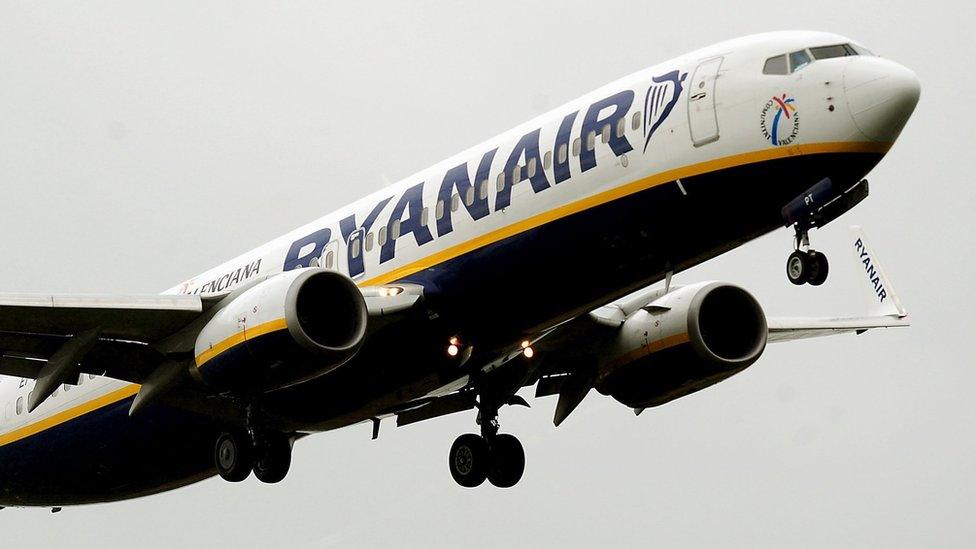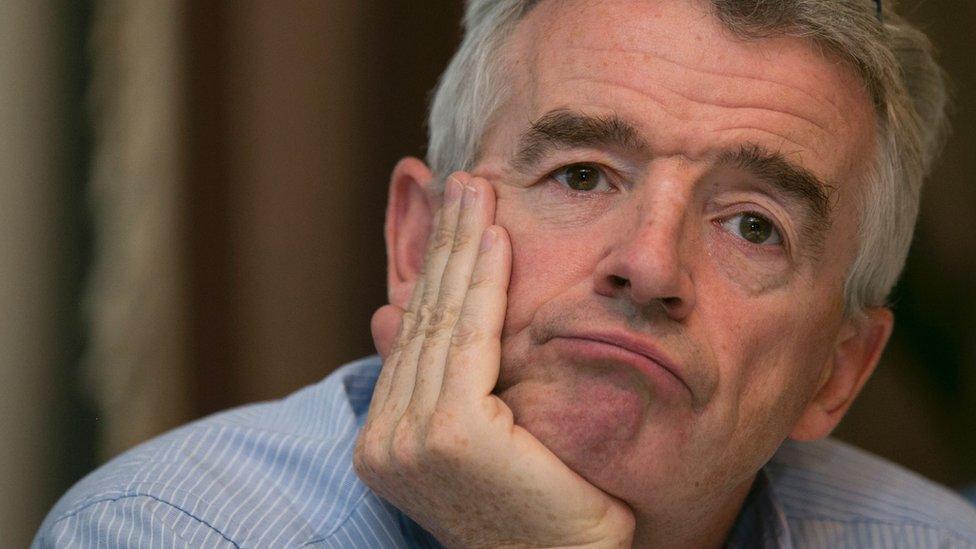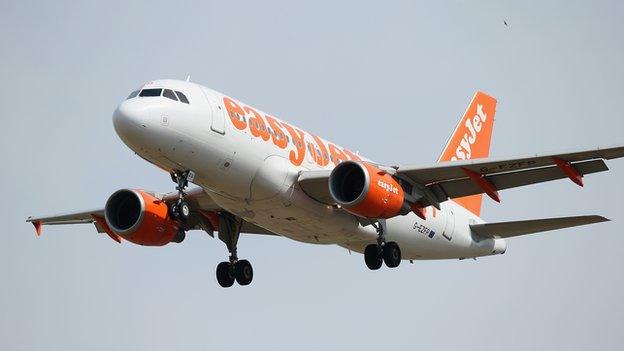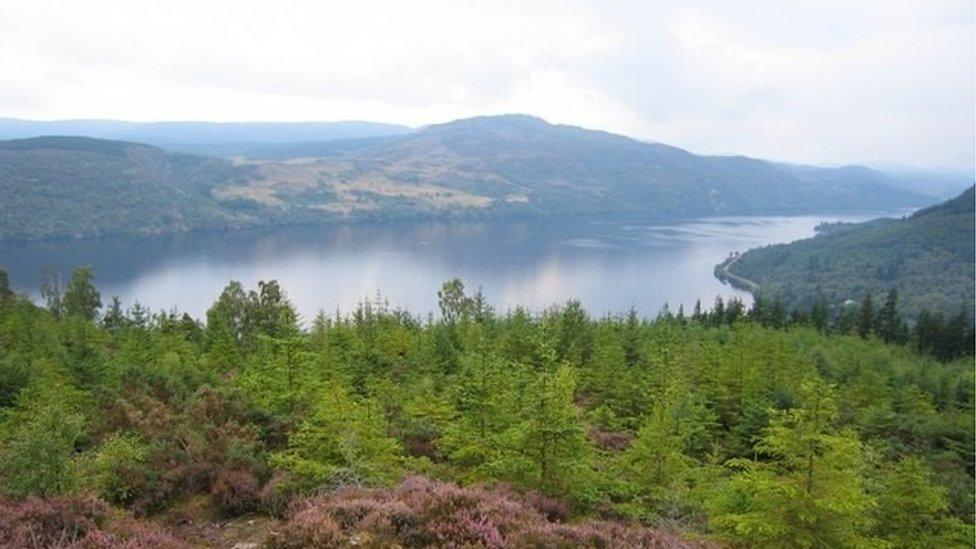O'Leary versus 'the Halfwits'
- Published

Michael O'Leary would do well in Edinburgh during August. The chief executive of Ryanair would make a great one-man Fringe show, not least by winding up the other established festivals.
In early September, he has a small media audience in the capital, most of it photographers, to snap his antics as he announced new routes linking Edinburgh with the sun next summer. Although the Fringe has gone, the routine is still firing off a barrage of comedy one-liners.
"If I'd known it was this good for business to be nice to passengers, I'd have done it years ago," he quips.
Behind that is an admission that treating passengers like cattle, in both their weakness for cheap fares and in the way they can be herded through airports, was holding back the airline's growth.
In the past three years, since Ryanair changed its tune and started to treat customers and their complaints with a more conventional respect, Michael O'Leary has been a rarer visitor for such new route announcements.
Instead of this O'Loose-Cannon, rather duller, safer colleagues have been sent out with a subtler corporate image.
Outspoken 'Leave' opponent
But this week, O'Leary's been back in both Edinburgh and Glasgow, rattling through his PowerPoint display with impatience and thinly-concealed contempt for his own corporate messaging.
He doesn't sound much of an enthusiast for the new cabin interior design, for instance, perhaps because it gets in the way of his passion for driving down cost.
And that's where we get on to the subject of Brexit. O'Leary was an outspoken opponent of the 'Leave' campaign before the June vote.

Michael O'Leary says the SNP government's plan to cut the rate in half doesn't go far enough
While others now respectfully talk of a democratic mandate, the airline boss has characteristically become even more outspoken.
He offers the view that even if Ireland wanted special trade relations with the UK, other European Union members wouldn't allow that. The idea that there won't be a hard Irish border for trade and travel is dismissed: "And look how well the border posts worked for Ireland before".
O'Leary has no truck with the Brexiteers' notion that they can do a deal that maintains full European market access and without free movement of people.
"These halfwit fe***rs," he says, naming UK cabinet members "will come back with their tail between their legs next year.
"Those who were talking about 'taking back control' will find they've got no fe****g control whatsoever.
"Don't let me get started on Brexit," he laughs.
Open Skies
That much is merely one man's opinion, among many. Where O'Leary's views and knowledge matter rather more is in the aviation industry.
Without an agreement on freedom of movement, he believes the UK won't get access to Europe's Open Skies - even though that regime has been extended well beyond the EU, "like the Eurovision Song Contest".
And if the UK industry is to be split from the EU one, the application of current rules will make a particularly difficult ownership and regulatory mess for British Airways and EasyJet.
The former is part of the IAG airline group, also including Iberia, Aer Lingus and Vueling.
The rules now state that the part of the group that's within the EU will have to remain more than half EU-owned. The part of the group in Britain would have to be largely British-owned. That would effectively mean a split.

Easyjet could locate its Midlands base to the continent
Michael O'Leary won't be shedding any tears about that, mind you. He's no fan of British Airways, or the takeover of Aer Lingus.
His leading rival for British passengers, EasyJet, has a different problem. Based in Britain, it would (under current rules) be allowed to fly between the UK and EU destinations, but would not be allowed to fly between EU airports. It currently has a lot of flights within the continent.
It could relocate its Midlands base to the continent, as EasyJet has suggested it may do. But if it does so, application of the rules would mean a bar on flying between British airports. It also does that a lot.
The same is true of Ryanair, but on a much lesser scale. Based in Ireland, and therefore continuing in the EU, the logic is that it would not be allowed to continue the handful of routes between Scotland and England or between Northern Ireland and the British mainland.
That's a sacrifice Michael O'Leary could live with, as his business is getting so big across Europe. With 50 more planes due for delivery in the next year, he would otherwise have put 10 into UK bases, but after the referendum, he's putting them elsewhere, as he "pivots away" from the UK towards better prospects, notably in Germany.
Such is the Ryanair boss's business style. Carrots and sticks are wielded with wild abandon. We're back to that cattle thing again.
Tax cut carrot
The carrot for Scotland is in the cutting of Air Passenger Duty (APD). It's no surprise or secret that Ryanair, other airlines and the airport owners, would like to see it go.
Mr O'Leary says the SNP government's plan to cut the rate in half doesn't go far enough. On a £20 ticket, £13 of that is APD. If ministers half the APD rate, it still looks like a tax rate of 65%.
Better to give up all the revenue, as Ireland did, and see your passenger numbers soar.
The carrot on offer is a claim that he will pile on the seat capacity, to double traffic within two years, bringing a lot of economic stimulus. And if APD is cut in half? He's not saying.
But he does blunder into an admission that the removal of that £13 tax would probably see his £7 fare rise to £10. That's 43% extra profit, when he's already earning comfortable margins.
Outbound flights
In Scotland and for now, Ryanair likes Glasgow and Edinburgh airports. It was a long-time complaint of O'Leary that they used to be run by the same company that owned the big London airports, BAA.
Split up by competition regulator diktat, he can now play them off against each other.

Mr O'Leary said he was not interested in Loch Ness tourism
And as the airports fight hard for routes, passengers and market share, that leaves Prestwick a beleaguered presence. It gets another Ryanair route next summer, but it's nowhere close to the numbers that Ryanair used to fly from the Baltic and to the Mediterranean.
And with the Scottish government now Prestwick's owner, sustaining significant ongoing losses, that's a problem for the public purse.
Aberdeen Airport is to have two Ryanair routes to the southern Spanish sun next summer. But if there is to be growth on the back of lower tax, the chief executive reckons Glasgow and Aberdeen will get 90% of the extra traffic.
Inverness? Well, it might sustain some outbound flights, but it's happy with the role of linking up the Highlands and Islands, suggests O'Leary.
The Loch Ness tourism honeypot? Nahh, he responds, with monstrous disdain. "It's a lake. Everyone's seen lakes."